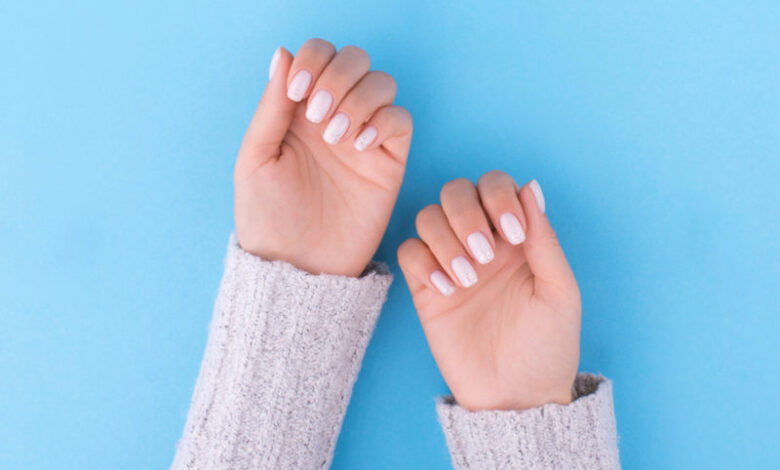How to Remove Shellac Nail Polish At Home

[ad_1]
We got expert advice on how to remove your grown-out gel manicure safely (no picking!) in the comfort of your home.
This article was originally published in March 2020.
I think we can all agree that in the beauty-sphere, Shellac and gel nail polish has been the best thing to come along since sliced bread. These LED-cured polishes bestow our nails with chip-resistant coverage, extreme shine and extend the longevity of our manicure for weeks. But with the highs, come the lows. The removal process is, well, a process! That’s why most of us leave it to the skilled nail artists and technicians to deal with when we transition from an old polish job to a new one.
But times are… strange. In a matter of a few days, we’ve staggered into a global pandemic, which means we’re all faced with an influx of new restrictions, including social distancing rules and spas and salons being temporarily shuttered. Since we’re all doing our part to stop the spread of COVID-19, which means staying home, what do we do with our gel nails? Pandemic or not, nails are going to continue to grow and if your gel manicure is on the brink of total collapse, it’s time to take removal matters into your own hands—and we’ll tell you how.
According to Leeanne Colley, the owner of Toronto’s Tips Nail Bar and a professional manicurist who’s worked with celebrity clients including Lady Gaga and Gigi Hadid, it’s not hard to remove gel polish at home, but it does take inner strength. “Sure, you need a few tools, most of which you probably already have at home. But the most important tool that people need is patience.”
There’s a common misconception that removing gel nail polish leaves nails weak and unhealthy. Untrue, says Colley. “When removal is done correctly and patiently, it doesn’t damage your nails,” she says. But peeling or picking, that’s a different story. It’s tempting and occasionally satisfying, but it causes major damage. “A single peel will remove at least six [of 50] layers of your nail,” says Colley. “It’s the worst thing you can do for your nails.” Frequent peeling weakens nails and over time it leaves them brittle, cracked and left with ridges.
We asked Colley to explain how to remove gel polish at home—which she promises in most cases can be completed in under 30 minutes. This translates to half an episode of RuPaul’s Drag Race<—or whatever 30-minute self-soothing show you’ve been binging on since social distancing and isolation became our new reality.
Tool Kit
You likely already have many (if not all) of the tools needed to do the job at home. But if you don’t, we’ve linked to websites you can order from, or listed alternatives you might find at home. Ready, set, soak!
Here’s what you likely already have on your cupboard:
- Aluminum foil (cut 10, 2-inch squares)
- Paper towel (cut 10, 1-inch squares)
Here’s what you might need to buy:
- 100% acetone (or acetone-based nail polish remover)
- Stainless steel cuticle pusher (or a wooden cuticle stick)
- Nail file
- Nail buffer
- Nail strengthening polish
- Cuticle oil (or coconut oil)
Step 1:Lightly file the tops of your nails
The first thing you want to do is break the gel polish seal on your nails using a file. “This part is crucial because a lot of the different gel nail polish companies have non-soak topcoats,” says Colley. Filing the nail breaks the seal, this way the acetone can pass right through the topcoat’s barrier and do all the heavy lifting.
Step 2: Become a wrap star
Once you’ve sanded away the topcoat on all 10 nails, Colley recommends working on one hand at a time. If you go all-in, you’re setting yourself up for failure. Start by saturating a small paper towel square with acetone, then immediately place it on your fingernail. Next, Colley says to tightly wrap the aluminum foil around your finger to cover the paper towel, then repeat on the other four digits. “Acetone evaporates, so air will slow it down. That’s why the tighter you can wrap the quicker the gel will lift,” says Colley.
Step 3: Let them soak
According to Colley, not all gel polishes are cut from the same cloth. “With so many brands, the formulas vary and some are more difficult to remove. Some can even take up to an hour.” Though in most cases, she says 15 minutes should do it. How can you tell if the gel is ready? “Remove a foil, and if it looks like the gel is lifting and crumbling you should be good to go.”
Step 4: Remove foils and push
Working one finger at a time, remove the foil and use the metal cuticle pusher or wooden cuticle stick, gently scrape the gel from the nail. “If you find the gel polish isn’t lifting easily, then nails need more time to soak,” Colley.
Step 5: Buff, baby, buff
Nails should look almost gel-free at this point, but you may have some rough spots. Use the less coarse side of the buffer to gently smooth any roughness left on the surface of the nail. “This step just removes any excess gel that’s left on your nail from the base coat,” says Colley. Plus, it leaves them extra smooth. Now, repeat steps one to five on your next hand.
Step 6: Give them some TLC
You should always moisturize your nails and the area around them, but it’s even more important after you’ve removed your gel polish manicure. Colley recommends using cuticle oil but if you don’t have any handy you can borrow from your pantry. “Using something like coconut oil as an after-care [cream] to add moisture can also be beneficial,” says Colley. She says gel-sensitive nails or not, our nails are naturally dry, so it’s less about hydrating them with cuticle oil and more about giving them flexibly, so they don’t break or crack. If you feel naked without nail polish, you can top your nails with a strengthening product. Colley likes OPI Nail Envy, which fortifies nails with hydrolyzed wheat protein and calcium.
If you need a visual step-by-step, visit the @tipsnailbar IG account for a how-to video created by Colley and one of her fellow master nail artists, Nargis Khan.
[ad_2]
Source link






